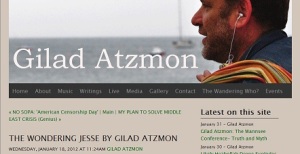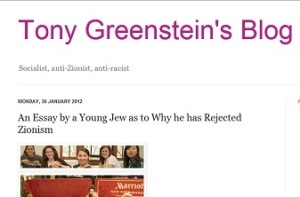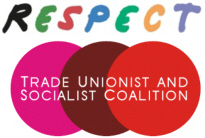As I have noted previously, both sides of the acrimonious dispute between the left-wing Jewish trends personified by Gilad Atzmon and Tony Greenstein respectively, have a fundamentally anti-racist thrust. Despite the fact that they spend much of their time virulently slandering each other, they actually agree on a great deal. This is despite the incredibly acrimonious war of words between them whose thrust I will not recap here as there is plenty of material elsewhere that details what is involved.
But as I stated before,for this reason this blog is proud to link both to Gilad Atzmon’s website, and to Tony Greenstein’s blog, as representatives of two different anti-racist, anti-Zionist, Jewish trends.
One interesting, and symptomatic indicator of this is that they are competing to win over the same kind of people. Progressive Jews who are sympathetic to the Palestinian cause. This recent case is emblematic of this.
On 18 January Gilad Atzmon published a posting titled ‘The Wondering Jesse’ praising a very moving and articulate essay by Jesse Lieberfeld, a young 11th Grade (year) Jewish-American student explaining his move away from Judaism and Zionism in solidarity with the Palestinians, and making very apposite comparisons between their struggle today and the struggle of Black Americans for basic human rights and equality in the civil rights movement a generation ago. Atzmon linked to the original, and recommended it to his readers. The essay jointly won the 2012 Martin Luther King Jr. prize for prose written by a young person – the obvious and powerful echoes and comparisons between such epic past struggles and those of those oppressed by Israel today make it particularly appropriate that he should win such an award for anti-racist writing.
Then on 30th January, the same essay was republished on Tony Greenstein’s blog. What can you say except to welcome this, and say the more the merrier? In neither case is there anything out of place or incongruous about this essay being published, since much of the material published on both sites consists of fervent anti-racist criticism of Zionism and the crimes of Israel.
Except, of course that Tony Greenstein’s blog contains a constant stream of invective saying that Gilad Atzmon and a number of those politically close to him are Jew-haters, racists, at times coming pretty close to equating them with fascists. In response, Gilad Atzmon publishes equally damning material denouncing Greenstein and his co-thinkers as ‘Anti-Zionist Zionists’, Sayanim (a Hebrew term for an Israeli agent of influence) and other similar epithets implying complete insincerity and having the aim to protect Israel.
One wonders where Tony Greenstein first learned of Jesse Lieberfeld’s essay and the acclaim it won.Did he by any chance discover it on the website of the supposed ‘Jew-hater’, Gilad Atzmon?
Surely if it was published by Atzmon, it must be, in its essential thrust, something useful to him to further the cause of ‘anti-semitism’. Mustn’t it? Surely an anti-semite and a Jew-hater would not publish a powerful anti-racist piece that showed that Jews were capable of breaking from Zionism and racism, and writing in a way liable to convince others to do the same! How could such an item possibly be published by an ‘essentialist’ who supposedly believes that Jews are the embodiment of evil?
On the other hand, one could just as well say, why would such an ‘anti-Zionist Zionist’ (sic!) as Tony Greenstein be inspired to publish something the ‘anti-semite’ Atzmon liked so much as an indictment of ‘Jewishness’ that he gave it the full headline treatment? That hardly makes much sense either!
The essay speaks for itself. I reprint it below, with link. It is a point of commonality between these two warring trends, and proof positive that what they say about each other cannot be true, in either case. If either side in this dispute were right about the other, they could not both be inspired by this essay! They would not be able to touch it with a ten-foot pole.
Somewhere, in the heat of polemical battle, some basic logic has gone missing somehow! Here’s hoping Jesse’s essay might have some effect in helping find it again!
Fighting a Forbidden Battle: How I Stopped Covering Up for a Hidden Wrong
Jesse Lieberfeld
11th grade, Winchester Thurston
I once belonged to a wonderful religion. I belonged to a religion that allows those of us who believe in it to feel that we are the greatest people in the world—and feel sorry for ourselves at the same time. Once, I thought that I truly belonged in this world of security, self-pity, self-proclaimed intelligence, and perfect moral aesthetic. I thought myself to be somewhat privileged early on. It was soon revealed to me, however, that my fellow believers and I were not part of anything so flattering.
Although I was fortunate enough to have parents who did not try to force me into any one set of beliefs, being Jewish was in no way possible to escape growing up. It was constantly reinforced at every holiday, every service, and every encounter with the rest of my relatives. I was forever reminded how intelligent my family was, how important it was to remember where we had come from, and to be proud of all the suffering our people had overcome in order to finally achieve their dream in the perfect society of Israel.
This last mandatory belief was one which I never fully understood, but I always kept the doubts I had about Israel’s spotless reputation to the back of my mind. “Our people” were fighting a war, one I did not fully comprehend, but I naturally assumed that it must be justified. We would never be so amoral as to fight an unjust war. Yet as I came to learn more about our so-called “conflict” with the Palestinians, I grew more concerned. I routinely heard about unexplained mass killings, attacks on medical bases, and other alarmingly violent actions for which I could see no possible reason. “Genocide” almost seemed the more appropriate term, yet no one I knew would have ever dreamed of portraying the war in that manner; they always described the situation in shockingly neutral terms. Whenever I brought up the subject, I was always given the answer that there were faults on both sides, that no one was really to blame, or simply that it was a “difficult situation.” It was not until eighth grade that I fully understood what I was on the side of. One afternoon, after a fresh round of killings was announced on our bus ride home, I asked two of my friends who actively supported Israel what they thought. “We need to defend our race,” they told me. “It’s our right.”
“We need to defend our race.”
Where had I heard that before? Wasn’t it the same excuse our own country had used to justify its abuses of African-Americans sixty years ago? In that moment, I realized how similar the two struggles were—like the white radicals of that era, we controlled the lives of another people whom we abused daily, and no one could speak out against us. It was too politically incorrect to do so. We had suffered too much, endured too many hardships, and overcome too many losses to be criticized. I realized then that I was in no way part of a “conflict”—the term “Israeli/Palestinian Conflict” was no more accurate than calling the Civil Rights Movement the “Caucasian/ African-American Conflict.” In both cases, the expression was a blatant euphemism: it gave the impression that this was a dispute among equals and that both held an equal share of the blame. However, in both, there was clearly an oppressor and an oppressed, and I felt horrified at the realization that I was by nature on the side of the oppressors. I was grouped with the racial supremacists. I was part of a group that killed while praising its own intelligence and reason. I was part of a delusion.
I thought of the leader of the other oppressed side of years ago, Martin Luther King. He too had been part of a struggle that had been hidden and glossed over for the convenience of those against whom he fought. What would his reaction have been? As it turned out, it was precisely the same as mine. As he wrote in his letter from Birmingham Jail, he believed the greatest enemy of his cause to be “Not the White Citizen’s Counciler or the Ku Klux Klanner, but the white moderate, who…lives by a mythical concept of time…. Lukewarm acceptance is much more bewildering than outright rejection.” When I first read those words, I felt as if I were staring at myself in a mirror. All my life I had been conditioned to simply treat the so-called conflict with the same apathy which King had so forcefully condemned. I, too, held the role of an accepting moderate. I, too, “lived by a mythical concept of time,” shrouded in my own surreal world and the set of beliefs that had been assigned to me. I had never before felt so trapped.
I decided to make one last appeal to my religion. If it could not answer my misgivings, no one could. The next time I attended a service, there was an open question-and-answer session about any point of our religion. I wanted to place my dilemma in as clear and simple terms as I knew how. I thought out my exact question over the course of the seventeen-minute cello solo that was routinely played during service. Previously, I had always accepted this solo as just another part of the program, yet now it seemed to capture the whole essence of our religion: intelligent and well-crafted on paper, yet completely oblivious to the outside world (the soloist did not have the faintest idea of how masterfully he was putting us all to sleep). When I was finally given the chance to ask a question, I asked, “I want to support Israel. But how can I when it lets its army commit so many killings?” I was met with a few angry glares from some of the older men, but the rabbi answered me. “It is a terrible thing, isn’t it?” he said. “But there’s nothing we can do. It’s just a fact of life.” I knew, of course, that the war was no simple matter and that we did not by any means commit murder for its own sake, but to portray our thousands of killings as a “fact of life” was simply too much for me to accept. I thanked him and walked out shortly afterward. I never went back. I thought about what I could do. If nothing else, I could at least try to free myself from the burden of being saddled with a belief I could not hold with a clear conscience. I could not live the rest of my life as one of the pathetic moderates whom King had rightfully portrayed as the worst part of the problem. I did not intend to go on being one of the Self-Chosen People, identifying myself as part of a group to which I did not belong.
It was different not being the ideal nice Jewish boy. The difference was subtle, yet by no means unaffecting. Whenever it came to the attention of any of our more religious family friends that I did not share their beliefs, I was met with either a disapproving stare and a quick change of the subject or an alarmed cry of, “What? Doesn’t Israel matter to you?” Relatives talked down to me more afterward, but eventually I stopped noticing the way adults around me perceived me. It was worth it to no longer feel as though I were just another apathetic part of the machine.
I can obviously never know what it must have been like to be an African-American in the 1950s. I do feel, however, as though I know exactly what it must have been like to be white during that time, to live under an aura of moral invincibility, to hold unchallengeable beliefs, and to contrive illusions of superiority to avoid having to face simple everyday truths. That illusion was nice while it lasted, but I decided to pass it up. I have never been happier.



David Ellis
February 2, 2012 at 4:29 pm
There is an absolutely belting letter in Weekly Worker regarding the current Greenstein-led witch hunt in PSC and the potentially fatal danger it poses to Palestinian solidarity in this country. Scum like Newman should read it not that it wouldn’t go in one side of his public school boy head and straight out the other. Perhaps you could feature that as well?
redscribe
February 2, 2012 at 11:16 pm
Yes, you are right David, this is a useful letter.
Actually, Tony Greenstein and even Joe Kane have gone up in my estimation somewhat having just read the rather amazing exchanges on Socialist Unity tonight
It is actually worth examining this discussion in some depth; it is revealing to see elements of Marxist rationality in Tony G and Joe K’s attack against Newman and co, even though there is obviously something seriously wrong with their reasoning in other ways.
Newman is simply a Stalinist-reformist with a large ego but mediocre ability who fancies himself as some kind of preposterous would-be star figure, with his blog as his means of making the big-time. A Scargill of the keyboard. Greenstein and Kane might have big problems with their politics, and real contradictions expressed even among the positive stuff they argued today (which probably should be probed when time allows), but it was very nice to see them wipe the floor with Newman over his banning people for views they do not actually hold.
Newman now stands completely naked, as do his real crypto-Zionist chums like ‘Jellytot’.
I’m not sure exactly how influential Newman and ‘Jellytot’ really are in ‘Hope not Hate’, but this blow- up and the quite ferocious attack on Jellytot by Joe Kane in particular could spell some trouble between the left-wing,anti-Zionist Jewish militants like Tony G, and the Nick Lowdes/Zionist crew who are more or less Newman’s co-thinkers now.
Which does indeed somewhat vindicate my point that this was a rotten alliance in the first place.
There are so many flaws and problems with all the different sides in this dispute that it actually takes a lot of thought to try to extract the elements of rationality that exist on all sides and try to synthesise them.
But one thing is clear, while there are valuable elements in both the Atzmon and Greenstein camps, there is not much left worth salvaging where Andy Newman is concerned.
The man has made himself look completely foolish. King Andrew has no clothes.
David Ellis
February 3, 2012 at 10:18 am
Nice stuff Red. Newman is a thoroughgoing opportunist on that we agree and he is helping out in the PSC witch hunt because he has links with the Stalinists who have links with Fatah and they don’t want anybody rocking the boat when it comes to recognising Israel and their gotesque little bantustan. Greenstein I feel is being manipulated in this cause. Suddenly his long-time feud with Atzmon is useful to the `drive the opponents of the two-state peace lie out of the movement’ brigade and of course when the Stalinist come on board who needs politics when a witch hunt coupled with underhand bureaucratic methods will suffice.
The truth is if the PSC is plague with anti-semites and holocaust deniers, and I don’t think that it is, in fact there are far too many zionists in there, then the only way to fight that is politically and that requires the correct policy around which to gather one’s forces. Opposing the two-state lie will marginalise the Zionists and supporting a unified democratic secular Palestine (Israel, Gaza, West Bank, Refugees) in which Muslims, Jews, Christians and those of no faith can live in harmony will marginaliise the anti-semites and might even win them away from such an ideology.
Congrats on reproducing the WW letter.